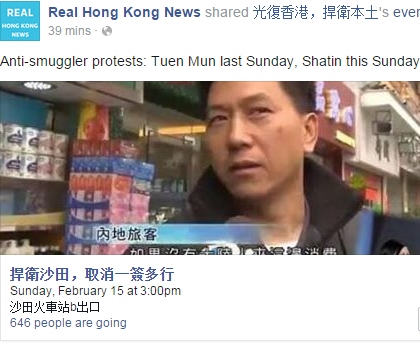Hong Kong Chief Executive CY Leung says “attacking malls and creating a nuisance to society” is unacceptable. So, he’s finally going to do something about the shoppers invading Hong Kong shopping centres and breaking Mainland laws by smuggling? No – he’s talking about the protesters.
Harbour Times presents a forthright contrarian view of the Mainland shoppers scourge. Rather than oppose the influx of cross-border traders into Tuen Mun and elsewhere, it says, we should rejoice at the money-making opportunities. Mothers who complain about shortages of milk powder are “fussy whiners,” while the shoppers are “honourable traders eking out an honest living.”
The article backs this up with paragraphs on the historical and current benefits of free trade to Hong Kong and the world. Only a Marxist would disagree with that. But the magazine misses the point. Protesters are not opposing the trading: they are against the extreme over-crowding and other nuisances making life intolerable for residents.
Harbour Times has not witnessed the scenes in border towns at first hand. We can tell because it begins a sentence: “If the MTR has a problem with overuse of their facilities…”
The suggested remedies to MTR overcrowding (if it exists): charge traders extra for using special repacking zones and for carrying over-size baggage, and create special lanes in the stations and space on trains for them to use. Good luck with implementing and enforcing all that, even assuming it would miraculously provide more space. More realistically, the article questions the government’s inevitable hang-up about using industrial buildings as outlets.
In feudal East Asia, merchants were the lowest class of society, ranked beneath gentry, soldiers, artisans and even peasant farmers. Charging more than you paid for something was considered almost immoral. Harbour Times seems to turn this upside down. People engaged in this cross-border arbitrage are so noble that everyone else must make way for them, whatever the inconvenience. This echoes the Hong Kong government’s assumption that developers’ and landlords’ interests automatically override the well-being of the rest of the community (and broader economy).
From an economic-policy viewpoint, Hong Kong’s ‘opportunity’ to make tons of lovely dough from Mainland shoppers is transitory, unsustainable and short-sighted.
It relies on an artificial distortion in the form of import and sales taxes on the other side of the border. The Chinese government could reduce levies on foreign milk powder, designer-label fashions and so on tomorrow, and the whole incentive for cross-border smuggling would vanish. It imposes growing burdens on transport, retail space, living costs and the streets that we have no hope of alleviating with extra capacity in any conceivable or reasonable time-frame. And the displacement of other economic activities is narrowing our economic base and reducing opportunities for entrepreneurs.
Indeed, many of the protesters believe the whole phenomenon is deliberately engineered to reduce Hong Kong to a giant mall offering only dead-end jobs – as a means of taming the city. Sounds like a conspiracy theory. But look at officials’ total refusal to do anything serious about Mainland smugglers (which means cutting the numbers). Look at the Chinese customs authorities’ apparent indifference to the smuggling. And look at the way officials blame the victims for complaining.
Following the success of last weekend’s Tuen Mun ‘Occupy Bus Stop’, the anti-smuggler movement squeezes past all the suitcase-draggers into Shatin on Sunday.



